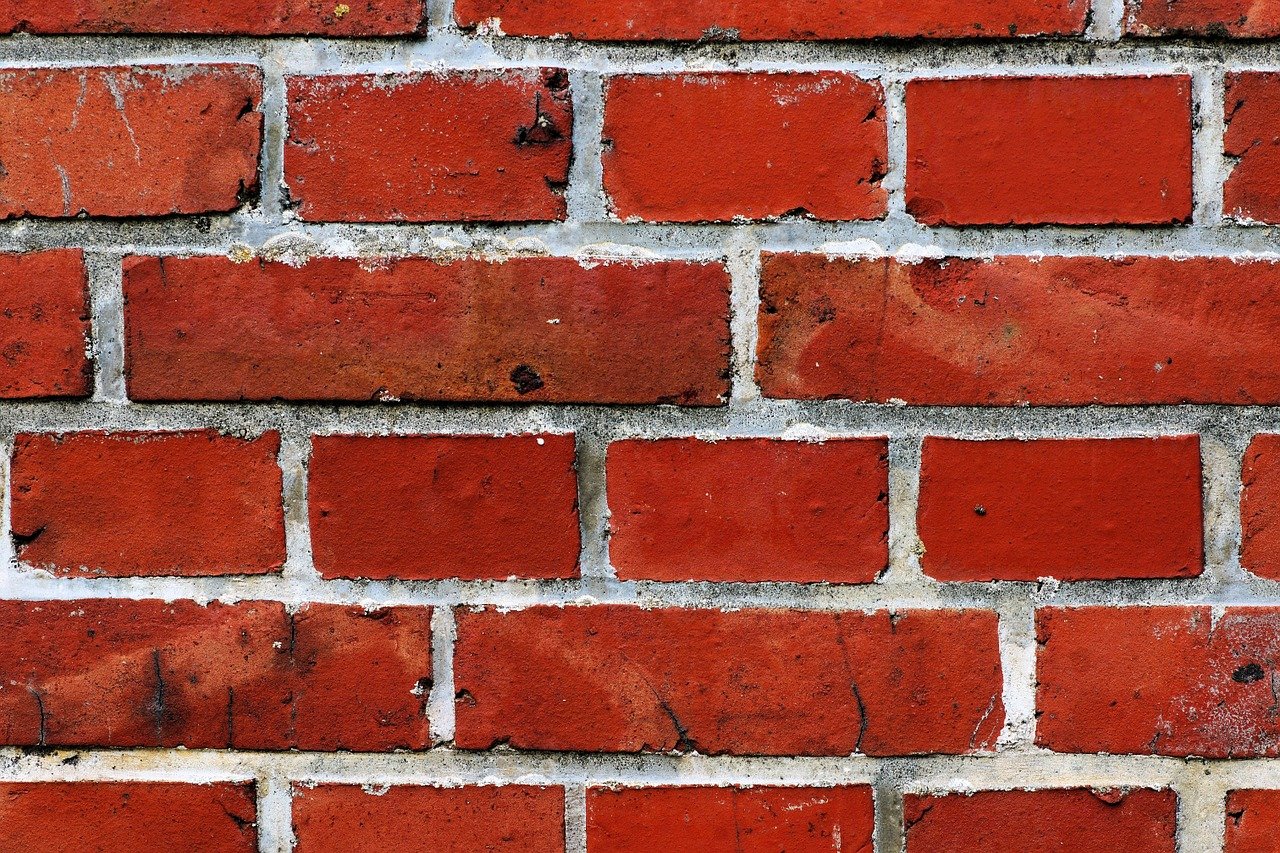Yes, bricks are good for soundproofing. Bricks are thick and dense material that helps to block sound passing from through it. The thicker the bricks are, the more difficult it is for sound waves to pass through them. The rich, dense property of the brick walls enables them to block out sound efficiently. Brick walls don’t allow sound waves to easily penetrate through them, making the sound waves deflect and bounce off the wall. This may however affect the noise inside the room.
- The great mass of brick masonry is best for acoustic sound insulation, especially for low-frequency noise.
- The brick wall reflects and blocks the sound and doesn’t absorb it. The density and thickness of the brick wall keep it protected from sound passing through it, but sound waves travel back to the source after getting bounced back instead of getting absorbed by the wall.
So, in short, bricks can be an excellent choice for soundproofing. In this guide, you will get valuable insight on how bricks can do an excellent job of soundproofing.
Are brick homes quiet?
Yes, brick homes are quiet. Brick is a natural insulator that eventually absorbs sound to keep your home quieter when the outside noises are kept outside. If you compare houses made with brick to the houses with other siding materials, you will find the brick one to be quieter.
- Bricks, which are made of clay, absorb outdoor sound quite well. Thus, you will enjoy a quieter homemade with bricks, despite outside noises.
- Bricks have high density, this makes most of the sound to reflect back to the source, allowing more incredible soundproofing qualities when compared to lighter materials.
- Whether it’s noisy neighbors, airplanes flying overhead, or road noise, bricks are most likely to quiet them than other materials.
- Bricks homes are quiet from both inside and out, enabling you to enjoy peace and privacy.
Is brick a good sound insulator?
Yes, brick is overall a good sound insulator. Brick is a natural insulator that protects homes from outside sound. Brickwork has a heavy mass together with excellent structural strength, making the brick walls a great insulating barrier against sound.
- Bricks have thicker and denser properties than any other materials, making them a good sound insulator.
- The thicker the material, the harder it is for the sound waves to pass through it. So, this may be the reason why you don’t hear on the other side of the brick wall but hear noises against a thinner material like drywall.
- Bricks are tightly placed together and then connected together with a good quality sealant. For this reason, brick walls do not have holes in between to allow sound waves to pass. Thus, sound waves bounce off the wall without affecting the peace on the other side of the wall.
Are bricks good for sound absorption?
No, bricks aren’t that good for sound absorption. This is because bricks don’t absorb sound, but they reflect and block the sound waves. In simple terms, the materials decide this phenomenon. Bricks are solid, rigid, and dense material, but materials that absorb sound are usually flexible with an open structure like acoustic foam. This is why bricks don’t absorb sound.
- STC or Sound Transmission Class is the rating that shows the level of performance by material in isolating sound.
- The STC rating of masonry or brick walls is around 44-55, which is a good beginning point for soundproofing. Thus, high STC means lesser sound insulation, so the brick wall doesn’t absorb sound.
However, you can always use brick walls as the beginning point of your soundproofing project. You have to only use a few dedicated materials like in addition to the bricks to enhance the sound absorption in a space. E.g. using foam sheet inside a brick wall will result in sound absorption.
Does sound bounce-off Bricks?
Yes, sound bounces off bricks. A brick wall never absorbs sound, but it does reflect, bounce off, and block it. If any material has more density, it always deflects and bounces sound off. Whereas if the material is porous, the material’s density gets reduced. As you know, brick is a material with high density, so it always bounces off sound waves.
- The density and thickness of a brick wall stops the sound waves from passing through the walls, making the sound waves bounce back in the direction of the source from where it has been generated.
- Another possible reason for sound to bounce off bricks is the sound’s wavelength inability to pass through the holes of the brick wall. The hard-to-penetrate structural integrity of the bricks makes them a deflecting medium for sound waves to bounce off.
BRICK VARIANTS AND THEIR SOUND INSULATION PROPERTIES

Is hollow brick soundproof?
Yes, hollow brick may work as an effective soundproof medium. While we may believe that the hollow structure reduces the gross density of the brick blocks, resulting in lesser sound insulation than the solid walls, it is not true. Hollow bricks are good at both, sound insulation as well as sound absorption. The complicated web structure of the open brick blocks influences the overall sound reduction index.
- The first surface of a wall plays a crucial role in reflecting a lot of sounds. However, a hollow brick has two surfaces, reflecting the sound waves twice than others, enabling a better soundproof experience.
- The wavelength of the sound also determines the level of soundproofing.
- Thickness resonance and bending of the shear waves are common effects of the sound waves trying to pass through the brick walls. This is due to the large thickness and structural integrity of the brick hollow walls.
If the bricks are stacked horizontally, allowing air and light to pass through the gaps, there will be negligible sound reduction.
Are glass bricks soundproof?
Yes, glass bricks are soundproof. A glass brick ensures the elimination of air leakage around it. The glass brick walls are sealed off with mortar in the wall, making it an effective soundproof solution.
- The mortar that helps the glass brick hold altogether also alleviates the air filtration from one side of the wall. This is because their airtight ability reduces drafts and sound resonance.
- Even though glass bricks are used for their ability to give privacy due to their pressed patterns on the glass, the patterns also deflect and diffuse sounds.
Below is a table that represents the type of bricks, their STC, and what kind of sound insulation they can bring – features. Take a glance.
Type Of Bricks | STC | Features |
Structural Clay Tile | 45 | Low-frequency sound transmission |
Face Brick Wall | 45 | Great acoustic insulation properties |
SCR Brick with gypsum board | 49 | 6-8 inches of wall thickness enables ultimate layer protection for walls. |
Face Brick Cavity Wall | 50 | 10 inches of thickness makes it highly soundproof and ideal for record studio walls, etc. |
Brick Wall (4 inches) | 50 | With 4 inches of thickness, it’s the ideal choice for residential soundproof walls. |
SCR Brick Wall | 51 | The STC rating of more than 50 indicates the high sound insulating properties. |
Solid Face Brick Wall | 52 | With 8 inches of wall thickness, its outside wythes are of face brick, and inside wythes are of common brick. |
Solid Brick Wall with gypsum board (8 in) | 53 | This brick wall is filled with mortar, covered with sealants to ensure extremely high sound insulation. |
Do sound insulation properties of bricks go down with time?
Yes, the sound insulation properties of bricks can go down with time. With time, the structural strength of the walls gets impacted if not appropriately maintained. There are various reasons why sound insulation properties can reduce over the years. Some of them are:
- Development of cracks: A brick wall can provide its best insulation until there are no cracks, gaps, and leaks and the bricks used are of a high standard.
- Unfilled joints: Brick wall constructions fail to perform efficiently over time due to flanking transmission, which is unfilled joints and gaps.
- Holes in the wall: If there’s any slight penetration on the brick wall, followed by other holes, the sound insulation properties will undoubtedly go down.
- No sealant: If there’s no render or paint over the brick wall, or if it’s not re-painted over time, the bricks lose sealant protection, leading to a reduction in sound insulation.
Summary
Bricks work really well in terms of providing sound proofing. They restrict the outside noise from coming inside. In case you are facing issues with your brick walls, you may get the gaps filled and a good sealant applied on top. If the walls are really old and are structurally weak, you need to get new walls built in place.




